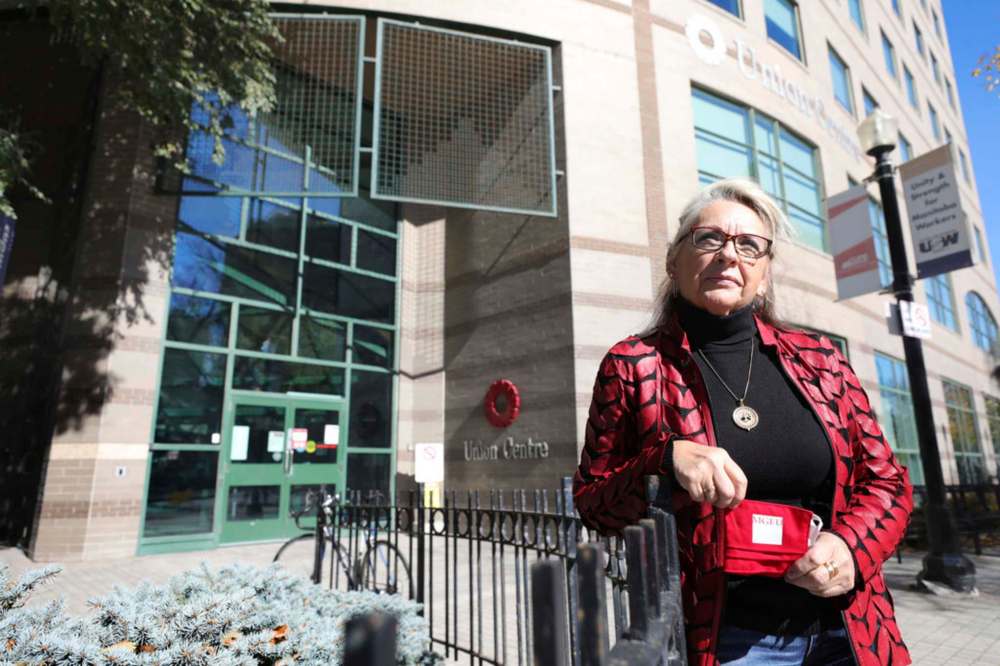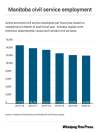Civil service feeling the strain: union
Province urged to beef up recruitment, retention efforts
Advertisement
Read this article for free:
or
Already have an account? Log in here »
To continue reading, please subscribe:
Monthly Digital Subscription
$0 for the first 4 weeks*
- Enjoy unlimited reading on winnipegfreepress.com
- Read the E-Edition, our digital replica newspaper
- Access News Break, our award-winning app
- Play interactive puzzles
*No charge for 4 weeks then price increases to the regular rate of $19.00 plus GST every four weeks. Offer available to new and qualified returning subscribers only. Cancel any time.
Monthly Digital Subscription
$4.75/week*
- Enjoy unlimited reading on winnipegfreepress.com
- Read the E-Edition, our digital replica newspaper
- Access News Break, our award-winning app
- Play interactive puzzles
*Billed as $19 plus GST every four weeks. Cancel any time.
To continue reading, please subscribe:
Add Free Press access to your Brandon Sun subscription for only an additional
$1 for the first 4 weeks*
*Your next subscription payment will increase by $1.00 and you will be charged $16.99 plus GST for four weeks. After four weeks, your payment will increase to $23.99 plus GST every four weeks.
Read unlimited articles for free today:
or
Already have an account? Log in here »
Hey there, time traveller!
This article was published 04/10/2021 (1526 days ago), so information in it may no longer be current.
Former premier Brian Pallister made good on his promise to scale back the civil service. By the time he stepped down as premier, it was reduced by 18 per cent. Now it’s expected to be cut by another 50 per cent, thanks to an aging workforce.
The Manitoba Civil Service Commission annual report for 2020-21 says that within five years, 21.9 per cent of civil servants and 34 per cent of senior managers will be eligible to retire.
As of March 31, the average age for all civil servants was 45.6 years; for senior managers, it was 50.7 years, the report said. Within 10 years, 40.5 per cent of civil servants and 61.6 per cent of senior managers will be eligible to retire.

Unless the province beefs up recruitment and retention efforts, Manitobans can expect the level of services they receive to suffer, says the union representing government workers.
“You can’t run government services without the bodies to do the work and managers to make sure policies are in place and planning is there for the long term,” said Michelle Gawronsky, president of the Manitoba Government and General Employees Union that represents nearly 32,000 members, many of whom are civil servants.
“It is something I’ve been saying for over a year.” Gawronsky said she’s been trying to find out how the provincial government plans to deal with the looming surge in civil service retirements after the workforce was already cut by nearly one fifth.
When the Progressive Conservatives formed government in 2016, there were 14,876 people employed in Manitoba’s civil service. Five years later, there were 12,232. The reduction of 2,644 positions has had an impact on the workload of civil servants across the spectrum, Gawronsky said.
“No matter where it is — they just can’t keep up with the present-day workload, never mind trying to address backlog” from Vital Statistics Agency to Manitoba Justice, she said.
With a giant wave of retirements on the horizon, “it’s only going to get worse,” said NDP finance critic Mark Wasyliw.
“We’re hearing from civil servants where (for example) they were in a unit with 14 people and 10 of them may be gone and there’s four people left that have to do the work of 14 and they’re getting burnt out,” Wasyliw said Friday.
“If they’re getting close to retirement, they’re going to retire,” he said. “We’re actually starting to see the effects of the six years the PC government has basically gone to war with civil servants,” he said, referring to the province going to court to try and freeze the wages of public sector employees.
“The reality is they don’t value what civil servants do, they don’t value public services and something as simple as getting a birth certificate and the marriage certificate has become an ordeal for Manitobans,” Wasyliw, a lawyer, said. “They can’t get a divorce or they can’t apply for permanent residency or certain federal government programs because they can’t just get a document — a simple, easy-to-get document.”
Gawronsky worries that the province has no strategy. “Are they running by the seat of their pants, year by year? Have they got a plan?”
The union leader said she was unable to get an audience with Pallister when he was premier and hopes his replacement will reverse course and replenish the ranks of the civil service before it is further depleted.
Premier Kelvin Goertzen called her shortly after being elected Manitoba’s caretaker premier by the governing Progressive Conservative caucus, she said. “It was a decent discussion,” she said. “He said ‘it won’t be the same as the old days, there’s been a change’. I hope that’s going to be what happens,” Gawronsky said.
“They have a new opportunity with a new leader coming in at the end of October.”
The PC party will elect either Heather Stefanson or Shelly Glover on Oct. 30, and one of them will be sworn in as Manitoba’s next premier.
Gawronsky said she hasn’t contacted either of the PC leadership candidates to get their take on the shrinking civil service.
Central Services Minister Reg Helwer, who is responsible for the civil service commission, was not available for an interview Friday. His office issued a statement on his behalf, saying the province is implementing recruitment strategies “to address current and future employment needs to ensure a sustainable workforce exists to meet the needs of Manitobans.”
They’re filling “priority” vacant positions and supporting “data-driven decision making for workforce and succession planning, and targeted outreach for difficult-to-recruit positions as required,” the statement said.
“The province has also developed alternate methods of service delivery during the pandemic to be able to continue to meet the needs of Manitobans by offering services virtually, digitally and through various online platforms to ensure accessibility across the province.”
carol.sanders@freepress.mb.ca

Our newsroom depends on a growing audience of readers to power our journalism. If you are not a paid reader, please consider becoming a subscriber.
Our newsroom depends on its audience of readers to power our journalism. Thank you for your support.




